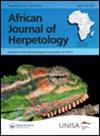成年非洲矮鳄的低频声乐曲目
IF 0.9
4区 生物学
Q3 ZOOLOGY
引用次数: 0
摘要
本文章由计算机程序翻译,如有差异,请以英文原文为准。
The low-frequency vocal repertoire of adult African dwarf crocodiles
ABSTRACT Acoustic techniques are rapidly becoming powerful tools for species monitoring and biodiversity assessment. These methods can be particularly appropriate for forest-dwelling crocodiles which are difficult to survey visually. However, basic vocal-repertoire data is lacking for many of the poorly known species. Here, we used passive acoustic recorders to capture 97 spontaneous vocal signals from a pair of captive adult African dwarf crocodiles (Osteolaemus tetraspis). We catalogued their acoustic repertoire and compared the calls recorded in captivity with 201 suspected wild O. tetraspis calls recorded in Gabon to determine whether the wild calls belonged to the same species. Captive and wild crocodiles produced the same four types of calls, not previously identified in other crocodylids. Short, low-frequency “drums” (31±12 Hz), longer, low-frequency “rumbles” (40 ± 14 Hz), as well as higher frequency “moos” (299 ± 133 Hz) and “gusts” (219 ± 108 Hz). Our results provide reference for species identification and support implementation of acoustic-based methods for African dwarf crocodile monitoring and conservation assessment. The data can further contribute to landscape-wide biodiversity monitoring and counter-poaching activities, as well as improving our understanding of crocodilian ecology and behaviour.
求助全文
通过发布文献求助,成功后即可免费获取论文全文。
去求助
来源期刊

African Journal of Herpetology
ZOOLOGY-
CiteScore
3.00
自引率
6.70%
发文量
15
审稿时长
>12 weeks
期刊介绍:
African Journal of Herpetology (AJH) serves as an outlet for original research on the biology of African amphibians and reptiles. AJH is an interdisciplinary journal that publishes original articles and reviews from diverse fields and disciplines, such as conservation, phylogenetics, evolution, systematics, performance, physiology, ecology, behavioural ecology, ethology, and morphology.
The Journal publishes two issues a year. There are no page charges .
 求助内容:
求助内容: 应助结果提醒方式:
应助结果提醒方式:


